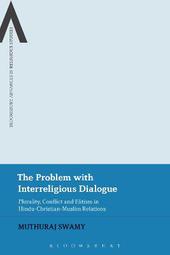
|
The Problem with Interreligious Dialogue: Plurality, Conflict and Elitism in Hindu-Christian-Muslim Relations
Hardback
Main Details
| Title |
The Problem with Interreligious Dialogue: Plurality, Conflict and Elitism in Hindu-Christian-Muslim Relations
|
| Authors and Contributors |
By (author) Dr Muthuraj Swamy
|
| Series | Bloomsbury Advances in Religious Studies |
|---|
| Physical Properties |
| Format:Hardback | | Pages:248 | | Dimensions(mm): Height 234,Width 156 |
|
| Category/Genre | Interfaith relations
Christianity
Hinduism
Islam |
|---|
| ISBN/Barcode |
9781474256407
|
| Classifications | Dewey:201.5 |
|---|
| Audience | | Tertiary Education (US: College) | |
|---|
|
Publishing Details |
| Publisher |
Bloomsbury Publishing PLC
|
| Imprint |
Bloomsbury Academic
|
| Publication Date |
24 March 2016 |
| Publication Country |
United Kingdom
|
Description
Muthuraj Swamy provides a fresh perspective on the world religions paradigm and 'interreligious dialogue'. By challenging the assumption that 'world religions' operate as essential entities separate from the lived experiences of practitioners, he shows that interreligious dialogue is in turn problematic as it is built on this very paradigm, and on the myth of religious conflict. Offering a critique of the idea of 'dialogue' as it has been advanced by its proponents such as religious leaders and theologians whose aims are to promote inter-religious conversation and understanding, the author argues that this approach is 'elitist' and that in reality, people do not make sharp distinctions between religions, nor do they separate political, economic, social and cultural beliefs and practices from their religious traditions. Case studies from villages in southern India explore how Hindu, Muslim and Christian communities interact in numerous ways that break the neat categories often used to describe each religion. Swamy argues that those who promote dialogue are ostensibly attempting to overcome the separate identities of religious practitioners through understanding, but in fact, they re-enforce them by encouraging a false sense of separation. The Problem with Interreligious Dialogue: Plurality, Conflict and Elitism in Hindu-Christian-Muslim Relations provides an innovative approach to a central issue confronting Religious Studies, combining both theory and ethnography.
Author Biography
Muthuraj Swamy is Assistant Professor and Head of the Department of Christian Theology & Ethics in the Union Biblical Seminary (Serampore University), Pune, India. He is the author of Christian Relations to Other Religions: Issues and Interpretations (2015) and Religion-State Relations in Early Christianity and Hindu Nationalism: A Contemporary Appraisal of St. Ambrose of Milan (2015).
ReviewsIn a style that is accessible, yet not reductionist, Swamy has successfully shown that most conflicts termed "religious" are anything but that...This work encourages academics and social scientists to undertake similar researches in other areas of religious studies, where many centuries-old constructs have been blindly followed. * Reading Religion * A well-grounded study that raises important questions for the future of interreligious dialogue ... I warmly recommend the book for those interested in interreligious dialogue, as well as interreligious relations and lived religion in India. * Studies in World Christianity * A detailed and thorough critique ... Swamy's writing style is clear and his overall argument diligently signposted throughout ... The book is a salutary and provocative addition to the literature concerning interreligious dialogue, and a good read for those interested in the politics of religion in India (and elsewhere) in all its discursive messiness. * Yana * Stripping away the overgrowth and debris that hid the inherent promise and ongoing potential of interreligious dialogue, and carefully, creatively, provocatively yet committedly using case studies and displaying mastery over a huge amount of literature, the author reopens and interrogates the meaning, limitations, and potential of dialogue in our messy 21st century. Just when one thinks that certain influential ideas and movements have run their course and reached an impasse, mainly because of faulty starting-points and overly simplistic assumptions about that catch-all word "religion", this is a book which skillfully forces us to confront our suppositions and reboot our commitments. * Jayakiran Sebastian, Dean and H. George Anderson Professor of Mission and Cultures *
|